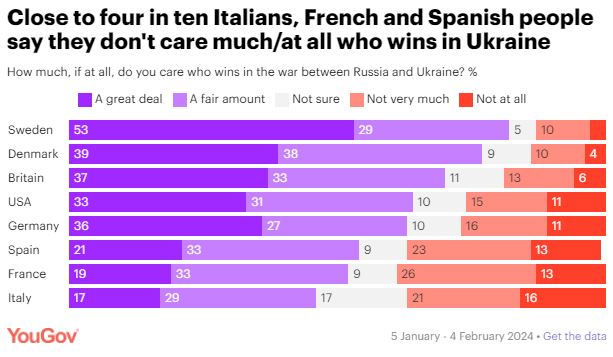
Attitudes remain largely the same as they were at the time of the first anniversary of the invasion
As we approach the second anniversary of the Russian invasion of Ukraine, the military situation in the beleaguered nation looks much the same now as it did a year ago.
This stalemate on the battlefield is mirrored in public opinion, with a new YouGov EuroTrack + US study (conducted in Denmark, France, Germany, Italy, Spain, Sweden, and the United Kingdom, as well as the United States) finding attitudes unchanged from a year ago.
Two years into the war, should the West encourage negotiations or support Ukraine until Russia quits?
Resolve is strongest in Sweden, Denmark and the UK, where 50-57% think the approach should be to support Ukraine until Russia is beaten. More than four in ten Americans (43%) say the same. In each of these four countries, those willing to stand by Ukraine significantly outnumber those who want to encourage a negotiated peace, at 21-27%.
Italians tend to take the opposite view, preferring a negotiated peace even if it left Russia still in control of parts of Ukraine by 45% to 28%.
The French, German and Spanish publics are all closely divided.

Two years into the Ukraine war, how much do Western Europeans and Americans care who wins?
There are likewise great differences between countries regarding how far people care who wins the war in Ukraine. Swedes care the most, with 82% saying it matters to them “a great deal” or “a fair amount” who wins the war, including a majority (53%) who care a great deal.
In Britain, 70% say they care who wins, as do 64% in the USA.
At the other end of the scale, only 46% of Italians say the outcome of the war matters much to them.

Relatively few in any nation surveyed actively want Russia to win – Germans (14%), French people and Italians (both 11%) are the most likely to say so.
While most people in each country want Ukraine to win, the numbers differ significantly, ranging from 88% in Denmark and 85% in Sweden to 52% in Italy. In the UK that figure stands at 79% and in the US it is 72%.
Two years on, is the West doing enough to prevent a Russian victory in Ukraine?
Across all eight countries surveyed, the belief is that the West is not providing enough support to Ukraine to help them ultimately repel their Russian adversaries. Swedes and Spaniards are the most likely to say so (both 64%) and Germans the least likely (44%). A majority of Britons (57%) likewise think the West is not doing enough, as do 46% of Americans.
Americans and Germans are the most likely to think that Ukraine is getting enough assistance, at 25-26%.

Two years into the war, what kind of support are Western Europeans and Americans willing to provide Ukraine?
While most across the West want Ukraine to win, and acknowledge that there is not enough support being given in order to make that happen, that does not equate to willingness to provide additional support.
Given the option to maintain, increase, or reduce aid to the beleaguered nation, the most common preference in each country surveyed is for the former, at 37-50% (except in Germany, where the 30% who want to maintain support levels are outweighed marginally by the 34% who want to reduce them).
Swedes are the most likely to want to send more support, at 30%.
In the USA, where recent attempts to get Congress to approve further funding for Ukraine have stalled, the public are relatively split – 23% want to send more support, 33% want to maintain current levels, and 26% want to reduce support.
When it comes to the kind of support people are willing to back, top of the list are ‘maintain the current sanctions regime’ (48-76%) and ‘imposing further economic sanctions on Russian interests in each country’ (44-70%).
There is also relatively strong support for sending additional weaponry and supplies to Ukraine (46-70%), although Italy is a notable outlier, with only 29% willing to back this move. In fact, fewer than 50% of Italians support any of the measures we tested.
Taking military action in Russia gathers the least in each country. Only between 13-33% support sending troops into Ukraine, and 19-38% back air strikes against Russian targets in the country.
Support for each measure has remained relatively static over the last year; in none of the European countries surveyed (the US has not been asked this question previously) has support for any measure increased by more than six points or fallen by more than four.
Nevertheless, compared to the first round of results, shortly after the invasion in 2022, enthusiasm for several of the measures is particularly diminished in Germany and Italy. These two countries are typically the least likely to want to give support to Ukraine.

With the war two years old, Europeans and Americans tend to think the conflict has at least another year to go
Unsurprisingly, given the results of the prior question, the most common belief (49-72%) is that the war has at least another war to run. This is up 4-12pts compared to last year in the European countries (the US was not surveyed last year).
Expectations that Ukraine will triumph over the next twelve months stand at only 9-13%, down slightly from last year. Few also expect that Russia will finally conquer Ukraine in the coming year, at 5-13%, effectively unchanged since 2023.

Source: YouGov
